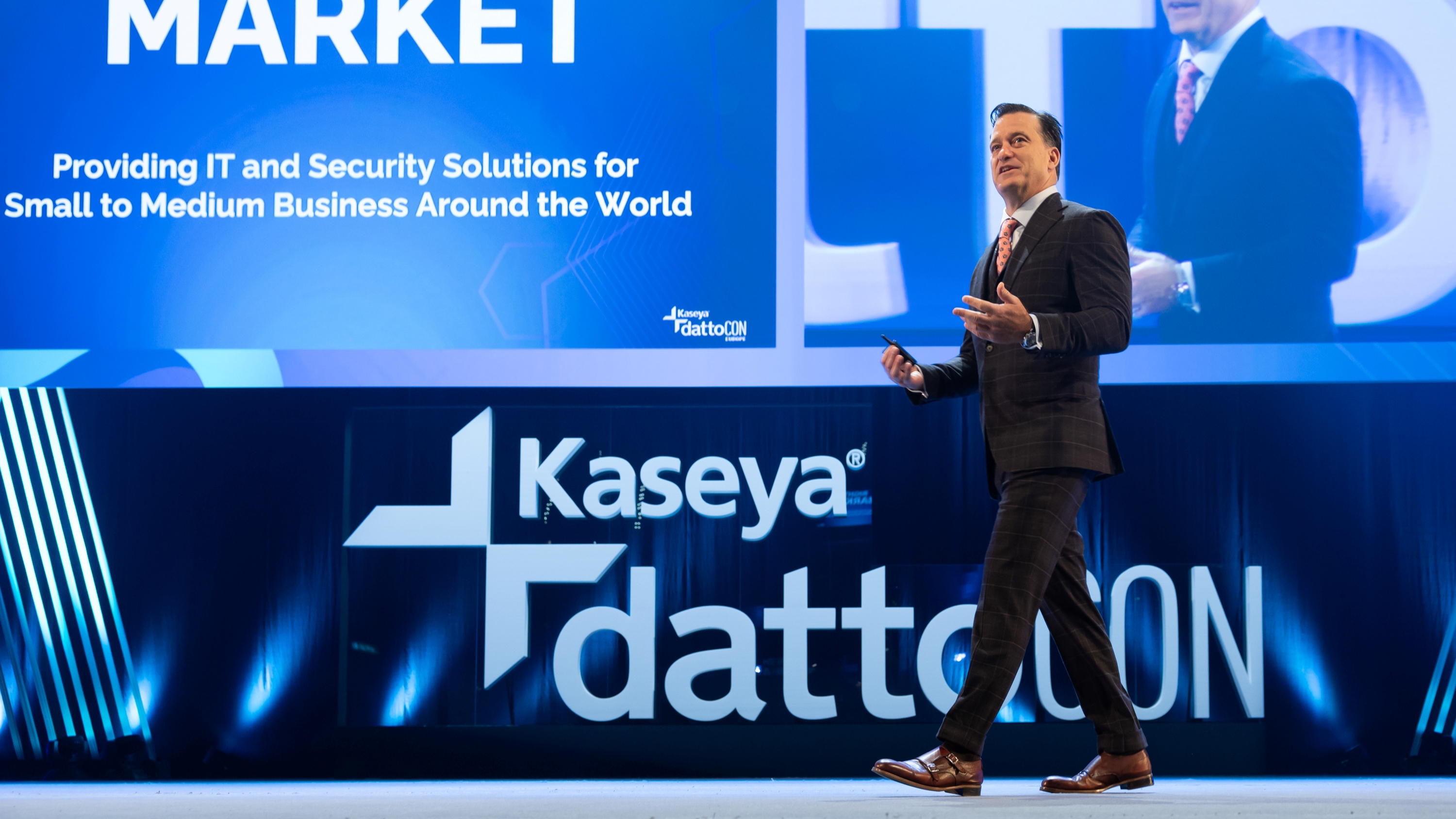Kaseya’s four-step journey to “changing unit economics for MSPs” gathers pace
ChannelPro’s recent interview with Kaseya CEO Fred Voccola gave a sneak peak into what comes after its hugely successful Kaseya 365 release


MSP appetite for Kaseya 365, the firm’s all-in-one endpoint automation, backup, and security subscription, has been ravenous in the less than three months since it launched.
And that’s just the beginning of a four-step investment and focused journey the company is making to try and make sure MSPs can make better margins, stay in business, and ensure SMBs remain protected amidst an escalating threat landscape.
So claims Fred Voccola, Kaseya’s CEO. Following on from an interview in March where he alluded to the imminent Kaseya 365 launch, he sat down with ChannelPro earlier this month to talk about its success and why it’s so important as a stand-alone announcement, but also in the context of the bigger picture, and more.
“We have over 4000, MSP partners that have adopted the Kaseya 365 in the 10 weeks, since we released it. We have over five million endpoints on this platform in 10 weeks. It's been like nothing I've ever seen, and nothing we've ever seen. It's, been well beyond our expectations,” he said.
“Kaseya 365 is the first step of a four-step process, where Kaseya believes that we can empower and enable and change the unit economics for the whole industry, so that MSPs should make a 30 to 35% profit.
"That's why there's so much interest. There's quite frankly such a wave of vigor from MSPs around the world to embrace Kaseya 365 and embrace Kaseya because the unit economics, the fundamental building blocks of the MSP industry, are broken. They’re financially broken. It's not in favor of the MSP.”
Kaseya aims to level the financial playing field
Most professional services businesses, for example, in the legal industry, make around one third or more profit, according to Voccola. But that’s not true of MSPs, who make, on average, a 10% margin. In the UK and Ireland this is somewhere between eight and 12 percent, but it’s still not enough, Voccola added.
Stay up to date with the latest Channel industry news and analysis with our twice-weekly newsletter
“SMBs [generally] have three business service providers they use, like solicitors/legal service providers, financial/tax service providers and [then] their MSP, their IT and security service.
“When you think about the relative importance of all three, in the last 10 years, it has changed. In the last 10 years, the SMB world has completely digitally transformed. It doesn't matter what industry you're in, they are now 100% dependent on business applications and industrial applications to run their business. What that means is that the MSP is now the most important and most strategic partner.”
He continued: “What an MSP does is a lot harder than what a solicitor or law, or an accounting firm does. I'm not saying accountants and lawyers aren't valuable and important. But what an MSP does is much more important to their customer and it is also much more challenging with more skill required… But their profit margins are like one-third of the other business providers. That is a huge injustice and a huge problem. It’s Kaseya’s company's mission to change the unit economics of the MSP industry so that MSPs, powered by Kaseya, will have a 30% to 35% profit margin.”
Fighting an almost-unseen fight
In addition to a quest to make MSPs more profitable or at least try and level the playing field, Kaseya’s quest has a higher mission, too, according to Voccola.
With cyber criminals increasingly turning their attention to smaller businesses - who lack the skills and budget to adequately protect themselves - it comes down to channel partners to step in and help.
“It's up to MSPs to play defense and prevent these attacks. But, here's the challenge that MSPs face. Most SMB owners are not super knowledgeable and aware of just how big this threat is, and that they're being targeted. [So], more often than not, that firm isn't necessarily willing to pay for advanced security,” Voccola said.
“About 80% of the customers of MSPs aren't fully paying for what they should be paying for. So that leaves the MSP in a pickle. And then if that customer gets hit, the MSP gets blamed no matter.
“What Kaseya 365 allows the MSP to do - in the event that they cannot convince their customer [to pay] - is still protect them. They never have to make the hard choice of allowing their customer to be partially naked., because all the cybersecurity stuff is included for free in Kaseya 365. So the MSP can deploy and then once it's deployed after three, four months, they show all the things they're doing. And then the customer says, ‘You're right. I'll pay for it.’ It eliminates that bad choice the MSPs have to make, which is, like Sophie's Choice. It's a terrible choice.”
The next big thing
While the momentum for Kaseya 365 and the benefits it offers - the company believes MSPs signed up so far are on track to collectively save around $400 million annually - continues to gather pace, the firm isn’t done yet, according to Voccola.
Indeed, he told ChannelPro that it has three more big announcements planned that will mean when we get to the one-year anniversary of its launch, MSPs will be even more set up for success.
“The response [to Kaysea 365] has been great. Again, it's been the first step in a four-step process. The next announcement we're going to make will be at DattoCon in Miami in three months. That announcement will be even more impactful for MSPs than what Kaseya 365 was,” he said.
RELATED WHITEPAPER

“So each of our four initiatives when they're complete - and the fourth will be completed in Vegas nine months from now at our global conference - each of these steps is moving us closer and closer to that 30% to 35%. profit margin for MSPs.
“The next step [being announced] in Miami is almost as impactful financially, but it's going to be more impactful operationally. As much as Kaseya 365 has changed the landscape, this will do more.”
Maggie has been a journalist since 1999, starting her career as an editorial assistant on then-weekly magazine Computing, before working her way up to senior reporter level. In 2006, just weeks before ITPro was launched, Maggie joined Dennis Publishing as a reporter. Having worked her way up to editor of ITPro, she was appointed group editor of CloudPro and ITPro in April 2012. She became the editorial director and took responsibility for ChannelPro, in 2016.
Her areas of particular interest, aside from cloud, include management and C-level issues, the business value of technology, green and environmental issues and careers to name but a few.
-
 Trump's AI executive order could leave US in a 'regulatory vacuum'
Trump's AI executive order could leave US in a 'regulatory vacuum'News Citing a "patchwork of 50 different regulatory regimes" and "ideological bias", President Trump wants rules to be set at a federal level
-
 TPUs: Google's home advantage
TPUs: Google's home advantageITPro Podcast How does TPU v7 stack up against Nvidia's latest chips – and can Google scale AI using only its own supply?
-
 Kaseya launches Kaseya 365 User subscription, acquires SaaS Alerts
Kaseya launches Kaseya 365 User subscription, acquires SaaS AlertsNews MSPs can access SaaS application monitoring and protection technology for free as part of the new subscription
-
 Best practices for Google Workspace business continuity
Best practices for Google Workspace business continuityWhitepaper Introducing a new model of business continuity that is focused on security and data protection
